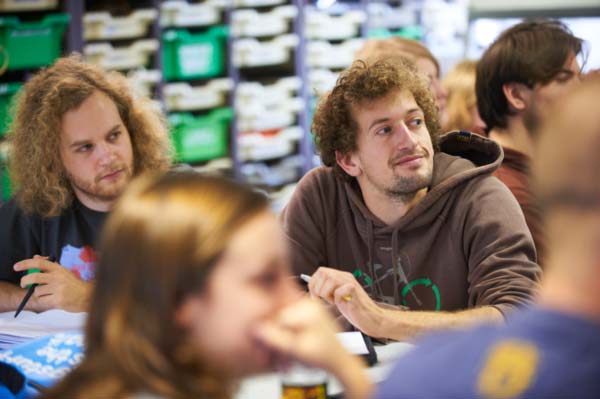
MA Education
Learn how to shape education around the globe
Year of entry: 2025 (September)
Explore the global forces that influence education and gain the skills you need to improve practice.
This course is designed for those with a broad interest in education. It's ideal for both education professionals looking to improve their practice and recent graduates looking to enter the field.
If you see yourself as a current or future teacher, lecturer, trainer, researcher, educational administrator or a policy maker, then this masters is for you.

Course content
This course provides a foundation for conducting your own small-scale research projects in a wide range of educational settings. You'll take a total of 180 credits, including core modules, option modules and a dissertation.
Your studies can focus on current developments in education and issues of immediate concern. As such, as well as providing a coherent and satisfying educational experience in its own right, this programme can serve as an excellent introduction to work at PhD level.
Modules
Core modules
- Teaching and Learning in Schools
- Theories of Learning and Development
- Research Methods for Education I: Researching Questions
- Research Methods for Education II: Researching Answers or Professional Practice in Education*
*You must choose this module in Semester 2 in order to take the Professional Practice Dissertation.
Option modules
You will also study two option modules:
- Bilingualism
- Motivation in Education
- Contemporary Issues in Teaching
- Intercultural Communication in Education
- Gender, Sexuality and Education
- Higher Education in the 21st Century
- Language and Power
- Evaluating UK Classroom Practice
- Migration in Education
- Teaching & Learning with Technology
Our modules may change to reflect the latest academic thinking and expertise of our staff, and in line with Department/School academic planning.
Dissertation
- Independent Study Module (Dissertation)
- Professional Practice Dissertation (you need to choose the Professional Practice in Education module in Semester 2 to take this option)
You will develop, design, implement and manage your own original research project, supervised by a member of staff with the relevant experience for your topic. To complete this masters, you will produce a 12,000-word dissertation based on your research project.
Examples of dissertations recently completed by students include:
- Teaching English Language for Cultural Understanding
- Identity and Language Learning
- Reforming Mathematics Education
- Practical Work in School Science Teaching
- Education Reform in Rural China
Learning outcomes
Every course at York is built on a distinctive set of learning outcomes. These will give you a clear understanding of what you will be able to accomplish at the end of the course and help you explain what you can offer employers. Our academics identify the knowledge, skills, and experiences you'll need upon graduation and then design the course to get you there.
Learning outcomes for this course
- analyse and assess the implications of current issues and key trends in the field of education based on a critical understanding of the sector and its methodological traditions.
- contribute to decision-making concerning teaching, learning and education by critically appraising, evaluating and synthesising information from diverse knowledge bases, literatures, perspectives and contexts to produce well-evidenced arguments.
- inform and improve practice in specific educational contexts by using a broad range of theoretical frameworks and concepts to evaluate approaches to teaching and learning.
- communicate complex information and arguments clearly, confidently and in a professional manner, making use of oral, written and visual formats.
- initiate and conduct independent, focused research projects by engaging in thorough planning, rigorous ethics procedures and the selection and application of appropriate principles, methodologies and approaches.
- collate, manage and critically analyse complex critical data using digital tools in order to support presented arguments.
Fees and funding
Annual tuition fees for 2025/26
| Study mode | UK (home) | International and EU |
|---|---|---|
| Full-time (1 year) | £11,200 | £25,900 |
Students on a Student Visa are not currently permitted to study part-time at York.
Fees information
UK (home) or international fees? The level of fee that you will be asked to pay depends on whether you're classed as a UK (home) or international student. Check your fee status.
Find out more information about tuition fees and how to pay them.
Additional costs
There are no mandatory additional fees, but we do recommend that you set aside some money for photocopying. Course books will be available from the Library and online reading packs are available for most modules, but you may wish to buy your own copies. Each book typically costs £20 to 40.
Funding information
Discover your funding options to help with tuition fees and living costs.
We'll confirm more funding opportunities for students joining us in 2025/26 throughout the year.
If you've successfully completed an undergraduate degree at York you could be eligible for a 10% Masters fee discount.
Funding opportunities
Chevening Scholarships
We are pleased to work with Chevening Scholars to offer funding for our Masters programmes. Chevening Scholarships provide one year of fully-funded postgraduate study in the UK for international (including EU) students. The scholarships are open to early and mid-career professionals who have the potential to become future leaders.
Chevening scholarships
Awarded by British embassies and high commissions, Chevening Scholarships provide one year of fully-funded postgraduate study in the UK. They are offered to early and mid-career professionals with the potential to become future leaders. We have hosted 34 Chevening Scholars in the past five years and welcome further enquiries and applications.

As an international student, MA Education has given me a broader perspective on education and a deeper understanding of how education is manifested in different cultures, languages and contexts, and how to integrate them.
Teaching and assessment
You’ll work with world‐leading academics who’ll challenge you to think independently and excel in all that you do. Our approach to teaching will provide you with the knowledge, opportunities, and support you need to grow and succeed in a global workplace.
Teaching format
You will be taught through a combination of formal lectures, seminars, practical exercises, workshops and online learning.
You'll spend time working on your own, reading assigned texts and researching supporting materials, as well as working with others in seminars to discuss and present your work.
There will also be opportunities to attend seminars from visiting scholars on a wide variety of educational topics.
Teaching location
You will be based in the Department of Education on Campus West. Teaching for this course takes place at various locations on Campus West.
About our campus
Our beautiful green campus offers a student-friendly setting in which to live and study, within easy reach of the action in the city centre. It's easy to get around campus - everything is within walking or pedalling distance, or you can always use the fast and frequent bus service.
Assessment and feedback
Types of assessments used throughout this course include:
- four 3,500-word assessed essays
- online exams
- research proposal and ethics audit
- to cap your studies, you'll complete a 12,000-word dissertation on an original piece of your own research.
Careers and skills
This broad-based course is an ideal grounding for postgraduate students looking to go on to further study such as PhD or to go into a career in teaching, journalism, policy-making or management.
The wide variety of optional modules allows you to tailor a study pathway in line with your individual interests and professional goals.
Career opportunities
- Teacher
- Online English curriculum designer at an education company
- Learning mentor
- Community education officer
- HR advisor
- Journalist
Transferable skills
- Qualitative and quantitative research methods
- Data analysis
- Design and completion of original research
- Critical reasoning
- Communication skills
- Academic and professional language skills in English
Entry requirements
| Qualification | Typical offer |
|---|---|
| Undergraduate degree | 2:2 undergraduate degree in a relevant subject. Some educational experience in either teaching or administration is also considered beneficial. |
| International pre-masters programme | Pre-masters from our International Pathway College |
| Other international qualifications | Equivalent qualifications from your country |
English language
If English isn't your first language you may need to provide evidence of your English language ability. We accept the following qualifications:
| Qualification | Minimum requirement |
|---|---|
| IELTS (Academic and Indicator) | 6.5, minimum 6.0 in each component |
| Cambridge CEFR | B2 First: 176, with 169 in each component |
| Oxford ELLT | 7, minimum of 6 in each component |
| Oxford Test of English Advanced | 136, minimum 126 in each component |
| Duolingo | 120, minimum 105 in all other components |
| LanguageCert SELT | B2 with 33/50 in each component |
| LanguageCert Academic | 70 with a minimum of 65 in each component |
| Kaplan Test of English Language | 478-509, with 444-477 in all other components |
| Skills for English | B2: Merit overall, with Pass with Merit in each component |
| PTE Academic | 61, minimum 55 in each component |
| TOEFL | 87, minimum 21 in each component |
| Trinity ISE III | Merit in all requirements |
For more information see our postgraduate English language requirements.
If you haven't met our English language requirements
You may be eligible for one of our pre-sessional English language courses. These courses will provide you with the level of English needed to meet the conditions of your offer.
The length of course you need to take depends on your current English language test scores and how much you need to improve to reach our English language requirements.
After you've accepted your offer to study at York, we'll confirm which pre-sessional course you should apply to via You@York.
Next steps
Contact us
Get in touch if you have any questions

Postgraduate Admissions team
education-masters-administrator
Department
Discover York






